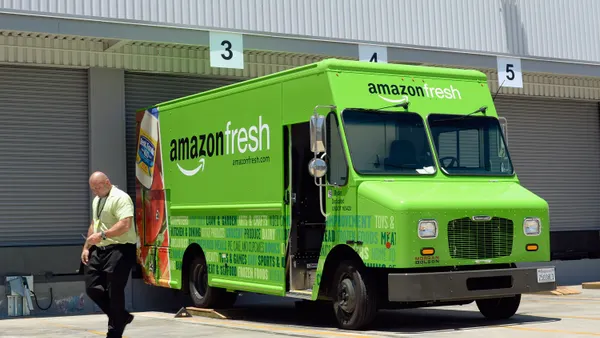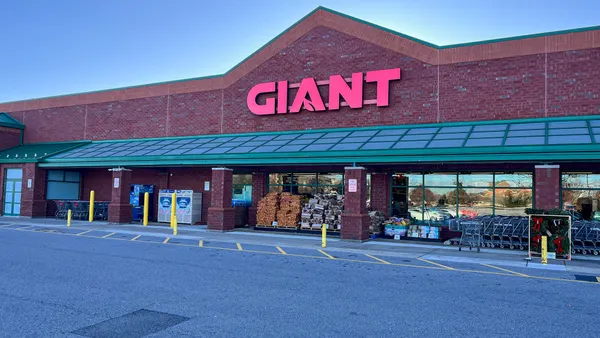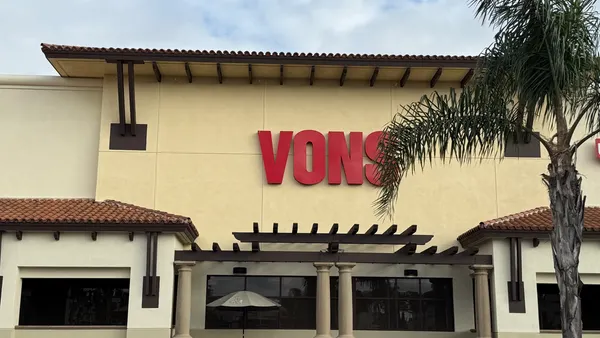It’s becoming a familiar tale in 2020: A grocer achieves early success, gets a major infusion of capital, expands rapidly, then runs into trouble and puts its stores up for sale.
For Earth Fare, that narrative reached its final step Monday as the company announced it would close down all 50 stores along with its corporate office, liquidate inventory and seek buyers for its remaining assets. The chain had been up for sale since September, according to a source familiar with the matter, but was unable to attract a buyer.
In a press release, the company cited debt and “continued challenges in the retail industry” that it could not overcome. Earth Fare declined to elaborate on what these challenges were, but experts said in interviews with Grocery Dive that the chain — like Lucky’s Market and Fairway Market, which both filed for bankruptcy last month — executed a flawed expansion plan.
“They made some strategic mistakes expanding too far into some non-continuous markets,” Burt Flickinger, managing director of Strategic Resources Group in New York, told Grocery Dive. He said Earth Fare’s key markets “were some of the most over-stored on the Eastern seaboard.”
Founded as a small health-food store in North Carolina in 1975, Earth Fare gained a loyal following for its selection of natural and organic foods and for its involvement in local communities. It expanded to just over a dozen stores in its first three decades.
Then in 2006, the company was acquired by private equity firm Monitor Clipper Partners, which sold a majority stake in Earth Fare to Oak Hill Capital Partners in 2012. The chain accelerated its expansion rate and pushed into new states like Florida and Alabama. It hired a CEO from the pharmaceutical industry in 2014 and focused on slashing its operating costs, including store labor, according to reports.
The company’s leadership saw an opportunity to become a national chain that had lower prices and was cheaper to operate than Whole Foods. In just over a decade, it more than tripled its store count.
But as Earth Fare grew, it lost the local appeal that had been so crucial to its early success, sources said. Its aggressive expansion plan also coincided with that of other chains like Sprouts Farmers Market, Lucky’s Market, Wegmans and discounters Aldi and Lidl, and targeted similar metros along the Mid-Atlantic and in the Southeast.
“That’s where all the population growth, income growth and real estate is. The problem is, everybody had the same idea,” Neil Stern, senior partner with McMillanDoolittle, told Grocery Dive.
Operating in crowded markets put the pressure on Earth Fare to differentiate. The company responded by creating a “Boot List” of banned ingredients, promoting local suppliers and offering deals on healthy meals. But this positioning struggled to gain an edge against so many other companies also focused on health and specialty products. Conventional chains like Kroger and Ahold Delhaize have ramped up their assortment of specialty private label items, while Walmart and Aldi have refreshed their grocery departments.
Since 2012, Earth Fare’s store count has doubled while its EBITDA fell by half, an industry analyst told Grocery Dive.
Competitive forces aside, experts said Earth Fare had systemic flaws as well. Stewart Samuel, program manager with IGD, wrote in a note on Monday that some stores were located in “constrained catchment areas” where competition, income levels and other factors limited their customer base. These stores struggled to generate the steady traffic Earth Fare’s operating model requires.
“With the stores mainly catering for the top-up shopping mission, the high-service operating model is challenging without significant volumes,” Samuel wrote.
Mark Heckman, a consultant and former executive with Marsh Supermarkets, said Earth Fare’s stores, which averaged between 20,000 and 25,000 square feet, were too large and saddled with too much inventory given consumer demand. He also believes the company’s specialty assortment was too “limited” to draw many health-conscious shoppers, and without the mainstream items that shoppers want to round out their shopping trips.
“Shoppers are not looking for reasons to add another store to their list of places they must frequent to fulfill their grocery needs,” Heckman wrote in an email to Grocery Dive. “If a new player comes to town, they must have a strong enough customer proposition to replace one that was already in the mix. Earth Fare failed to make that happen.”
Earth Fare’s exit combined with Lucky’s bankruptcy last month amounts to a reckoning for a once soaring specialty grocer class. Although these chains, along with others like The Fresh Market and Fresh Thyme Farmer’s Market, succeeded initially by offering unique assortments and lower prices than Whole Foods, they’re struggling to evolve.
"You’ve got to keep on pushing and pushing the model," Phil Lempert, industry consultant and founder of SupermarketGuru.com, told Grocery Dive. "You can’t take a breath."
Heckman said Fresh Thyme, which recently closed three stores, and The Fresh Market could fall victim to the competitive forces that undid Earth Fare and Lucky’s. Stern noted Fresh Thyme’s investment from Meijer should insulate it for the time being. The Fresh Market, in the meantime, has reined in-store growth and refocused on its gourmet specialty roots.
"If a new player comes to town, they must have a strong enough customer proposition to replace one that was already in the mix. Earth Fare failed to make that happen."

Mark Heckman
Consultant and former Marsh Supermarkets executive
Flickinger said specialty chains should prioritize slow, sustainable growth in the future. He cited Upper Midwest chains like Lunds & Byerlys and Kowalski's as examples of specialty grocers that have succeeded by focusing on regional expansion.
Given their large size and market overlap with Earth Fare and Lucky’s, Sprouts and Whole Foods appear to be the main beneficiaries of this round of specialty store closures, sources said. But these chains certainly don’t have it easy. Whole Foods has not returned to profitable growth under Amazon, according to that company’s quarterly earnings reports, while Sprouts’ stock has dropped with the news from Lucky’s and Earth Fare.
“It’s an unforgiving market out there,” Flickinger said.











